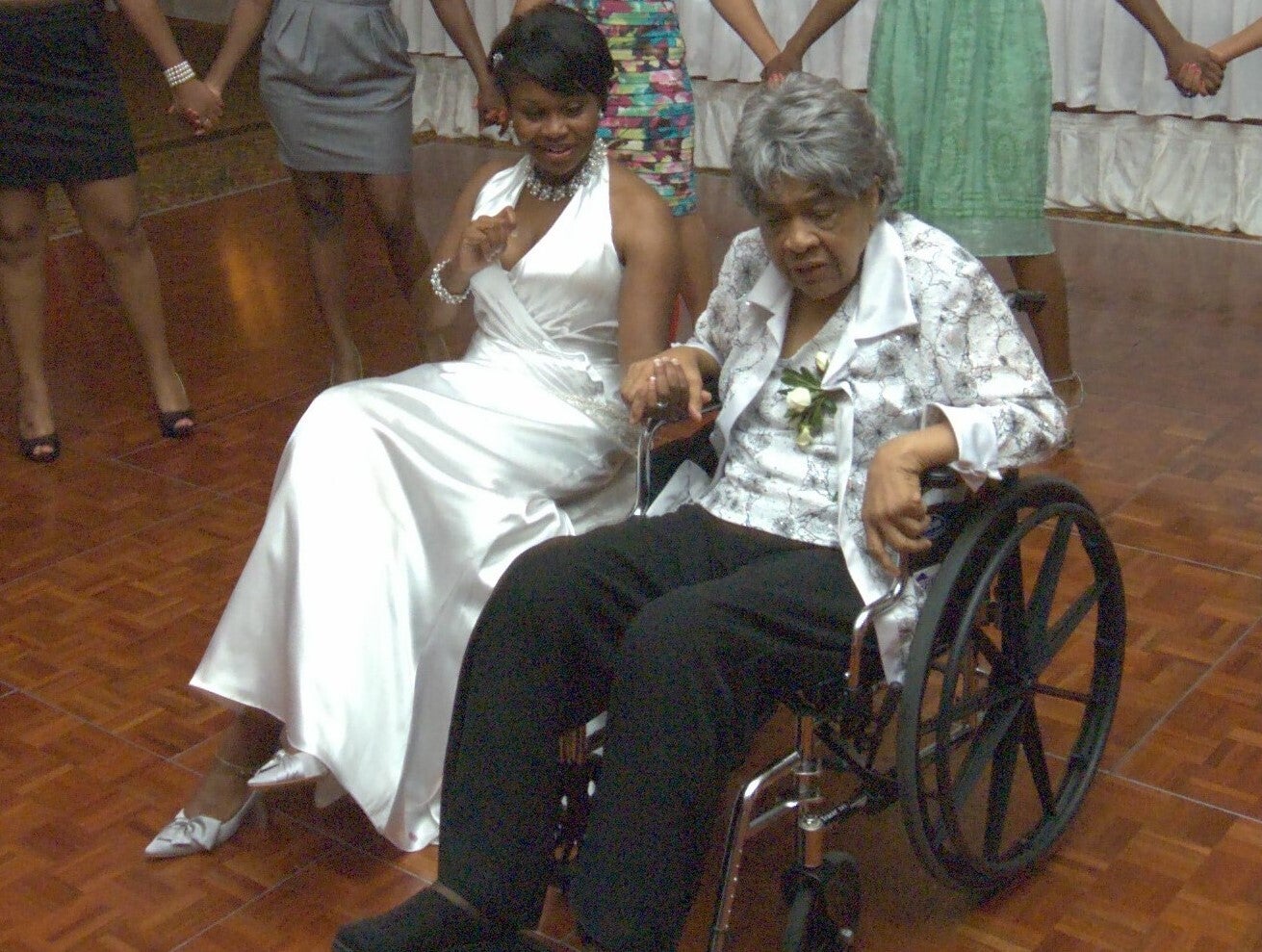
In honor of National Caregivers Month (November), we connected with Crystal Williams, associate vice president and assistant general counsel, Lilly Neuroscience therapeutics to discuss ways to support loved ones living with Alzheimer’s disease. With innovations for treating Alzheimer’s disease approved, and as research continues to advance around early detection, prevention and treatment1, the way people live with and care for someone with Alzheimer’s disease continues to evolve.
For Crystal – and many others – this disease is personal. Her grandmother lived with Alzheimer’s disease for several years. As her grandmother’s disease progressed, each visit with her was a bittersweet reminder of the vibrant woman she once was, leaving her both heartbroken but grateful for the memories they still shared. Through this experience and her work at Lilly, Crystal became more passionate about supporting caregivers as they support their loved ones living with the disease.
As the number of people living with Alzheimer’s disease and dementia grows, so does the need for caregiving. After diagnosis, caregivers play a crucial role in supporting their loved ones throughout their Alzheimer’s journey. But what some may not realize is that the role of a caregiver often begins before their loved one is diagnosed by a healthcare professional. Memory and thinking issues seen in people experiencing the early symptomatic stages of the disease, including mild cognitive impairment and mild dementia, may be dismissed as normal aging. But identifying these signs is important because earlier diagnosis may offer more options for a treatment that could potentially slow disease progression. However, more than half of patients with dementia have never been formally diagnosed, and those with a diagnosis often wait more than two years after symptom onset2-3. Williams discusses how caregivers can help close this gap by initiating conversations about care with their loved one soon after recognizing the first sign of symptoms and encouraging their loved one to talk to their doctor about these issues.

Q: How has Alzheimer’s disease impacted you personally?
I’ve been with Lilly for over 10 years, and I feel the work we do here is truly life-changing and lifesaving. Alzheimer’s disease, however, is particularly personal for me.
My grandmother had Alzheimer’s disease, which profoundly impacted our family. She was an exceptional woman, very close to me. She attended Indiana University in the 1940s when Black students weren’t allowed to stay on campus. It was there she met my grandfather, and they were married for 63 years.
Throughout their marriage, my grandfather unwaveringly cared for her, refusing to let anyone else take over. It required a significant team effort to support him as the primary caregiver. It was challenging because she was once such a bold, vibrant, and spirited woman, and witnessing her decline was difficult for our family.
One of my most cherished memories of her is from my wedding. We shared membership in Delta Sigma Theta Sorority, Inc., a bond that included a beautiful tradition: at any joyous event, sorority sisters come together to form a circle, hold hands, and sing a special song. Despite her illness, my grandmother was wheeled next to me during this tradition, and though she barely spoke and didn’t recognize me, she joined in singing. It felt like a brief but poignant return to the person she once was.
She lived for a few more years after that moment, but that memory remains vivid and powerful, constantly reminding me of the devastation caused by the disease and the arduous journey it entails. It is memories like this that motivate me every day to continue my work.
Q: What can a loved one do when they see the first sign of changes in
memory or thinking, and what might this look like?
It is imperative now, more than ever, for loved ones to summon the courage and initiate conversations at the earliest signs of changes in memory or cognitive functions. This is particularly important in Black families, where early intervention in addressing Alzheimer’s disease is not typically the norm. These discussions demand a gentle and empathetic approach yet loved ones should not be deterred from bringing up the issue at the outset. Early conversations with a doctor along with recognition of Alzheimer’s disease and the availability of approved treatments for early symptomatic Alzheimer’s disease, can potentially alter the course of the disease as these treatments potentially slow the progression of the disease.
Q: What tips do you have for caregivers to help their loved ones
determine their diagnosis.
Caregivers should be proactive, caring, yet assertive in encouraging their loved one to determine their diagnosis and provide rationale for why it’s important. While Alzheimer’s disease is the most common form of dementia, there are other forms as well, so it’s important to discern the diagnosis to better inform next steps.
Volunteering to accompany a loved one to doctor appointments can provide crucial support and ensure that they do not feel alone during this challenging time. It also allows caregivers to help relay important information to the healthcare provider and ensures that all concerns about memory and thinking issues are thoroughly discussed. Those experiencing memory and thinking issues might feel hesitant or embarrassed but reinforcing the importance of being open and honest with their doctor can lead to a more accurate diagnosis and timely intervention. Empowering them to voice their concerns ensures that the healthcare provider has a comprehensive understanding of their symptoms, which is important for determining next steps.
Q: What is the benefit of a timely diagnosis?
At the very least, obtaining a timely diagnosis allows for families to have informed conversations about the future and better prepare for the journey, ensuring that the individual’s wishes are respected. It also allows loved ones to focus on the things that matter most to them now while still in the early stages of the disease. In addition, earlier diagnosis offers more options for a treatment that may slow disease progression.
Q: What are some common misconceptions about Alzheimer’s
disease that you’ve encountered?
We need to change the perception of what an Alzheimer’s patient looks like. Experts believe that Alzheimer’s disease may begin up to 20 years prior to signs of cognitive and functional decline, so it is crucial to include those in the earlier stages who have mild cognitive impairment in our understanding of the disease. This refreshed perception of the disease ensures that both patients and caregivers receive the necessary support and care at a stage where it can make the most impact.
Q: Why is it important to advocate for this community?
Advocacy is crucial for individuals experiencing thinking and memory issues, as they often feel scared to admit their struggles to others. Engaging them in open conversations and creating a safe environment can be incredibly encouraging. This support can make a significant difference in their willingness to seek help. Accompanying them to doctor appointments and advocating on their behalf empowers them to be transparent with their health care providers, which can lead to better diagnosis and care. Additionally, this active involvement helps reduce the stigma associated with cognitive impairment, fostering a more understanding and supportive community for those affected by Alzheimer’s disease.
To learn more about Alzheimer’s disease and Lilly’s work in this area, visit their website.
References
- Cummings J, Zhou Y, Lee G, Zhong K, Fonseca J, Cheng F. Alzheimer’s disease drug development pipeline: 2024. Alzheimer’s Dement. 2024; 10:e12465. https://doi.org/10.1002/trc2.12465
- Alzheimer’s Association. 2023 Alzheimer’s Disease Facts and Figures. Accessed October 2024. https://alz-journals.onlinelibrary.wiley.com/doi/10.1002/alz.13016
- Soeren Mattke, Mark Hanson. Expected wait times for access to a disease-modifying Alzheimer’s treatment in the United States. PMID: 34569686 DOI: 10.1002/alz.12470 Accessed October 2024. https://pubmed.ncbi.nlm.nih.gov/34569686/